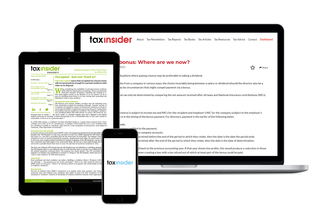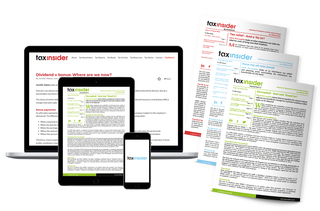New articles published
in April 2025
-
Capital Gains Tax in 2025: A Look at Recent Developments
These appear to be tumultuous times with respect to tax, with the Labour government having passed one Budget and with a Spring Statement on the way at the time of writing.
Capital gains tax (CGT) has been subject to numerous changes over the last few years; so where are we with it in early 2025?Chris Thorpe looks at recent developments regarding capital gains tax.
-
How to Pass a £1M Estate Tax-Free: Inheritance Tax Insights
Everyone is entitled to an inheritance tax (IHT) ‘nil-rate band’ of up to £325,000 (for 2025/26) on death, reduced by any gifts which are not exempt within seven years before death.
Mark McLaughlin looks at when an estate worth up to £1m might be passed upon an individual’s death without an inheritance tax bill.
-
Maximising Profitability: Navigating Tax Impacts of Business Funding
The tax implications of any source of business finance depend upon the nature of the financing and the purpose of the funds.
Each source carries distinct tax consequences that can impact a business's profitability, tax liability, and financial structure.Jennifer Adams outlines the tax implications associated with various sources of funding for a business.
-
Offside! Famous footballer falls foul of IR35 rules
Football supporters of a certain age will be familiar with the name of Bryan Robson, particularly the important part he played between 1981 and 1994 in the success of Manchester United Football Club (MUFC).
Richard Curtis reviews the recent case of Robson v Revenue and Customs on employment status.
-
Keeping a VAT Number When Buying a Business: Pros & Cons
You can transfer a VAT registration number if there’s a change of business ownership or legal status.
For example, if:
• you take over a company and want to keep using its VAT registration number; or
• your business changes from a partnership to a sole trader or becomes a limited company.This means the business will keep the same VAT registration number.
Andrew Needham looks at the ‘pros’ and ‘cons’ of retaining an existing VAT number when buying a business or changing the legal entity.
-
2024 Budget: Inheritance Tax Changes for Farmers and Businesses
The changes to agricultural property relief (APR) and business property relief (BPR) announced in the Autumn Budget 2024 by Rachel Reeves mean that, for the first time in over thirty years, some farms and other trading businesses will potentially come within the inheritance tax (IHT) net from 6 April 2026.
Kevin Read considers some of the inheritance tax issues on the horizon for trading businesses and farmers.
-
How to Make the Most of Your Capital Gains Tax Exemption
The UK’s tax rules generally give individuals an annual exemption from capital gains tax (CGT).
Tristan Noyes looks at the capital gains tax annual exemption and considers a popular planning technique.
-
Q&As with Arthur Weller
Some of our most popular articles
-
Dividends or bonuses? We can work it out!
Consider the following scenario:
'On a wintry sunny morning, Alan was reviewing his company’s January 2024 management accounts. Alan was the sole director and 100% shareholder of Llandudno Hotels Ltd, which operated two large hotels in Llandudno. The business was on course to healthy pre-tax profit of around £650,000 for the year ended 31 March 2024. Alan had been planning to pay himself a substantial ‘bonus’ before the year-end'.
What does Alan do?
Peter Rayney examines an owner-manager’s cash extraction following the numerous tax and National Insurance contributions changes.
-
Use them or lose them: 2023/24 tax allowances
As the tax year draws to a close, it is prudent to review one’s 2023/24 tax allowances and consider whether there is scope for utilising any unused allowances so they are not lost.
Sarah Bradford explores options for using 2023/24 tax allowances so they are not wasted.
-
Record-keeping in a digital age
Lee Sharpe looks at taxpayers’ record-keeping obligations in light of HMRC’s inexorable march to digital everything (almost).
Historically, HMRC has been quite relaxed about whether original records must be maintained or digital facsimiles (scans, etc.).
-
Trap for business owners seeking CGT incorporation relief
HM Revenue and Customs (HMRC) recently commenced a ‘One to Many’ campaign, targeting taxpayers who incorporated property businesses in the tax year 2017/18 but reported no capital gains tax (CGT) liability in their tax returns on the basis that ‘incorporation relief’ applied in full.
Mark McLaughlin highlights a potential trap for business owners seeking capital gains tax incorporation relief.
-
Q&As with Arthur Weller
Subscription Benefits
We asked our subscribers what they love about Tax Insider Bundle.
These are the top 7 reasons that they gave us:
Monthly Newsletter
Tax Insider Bundle…





